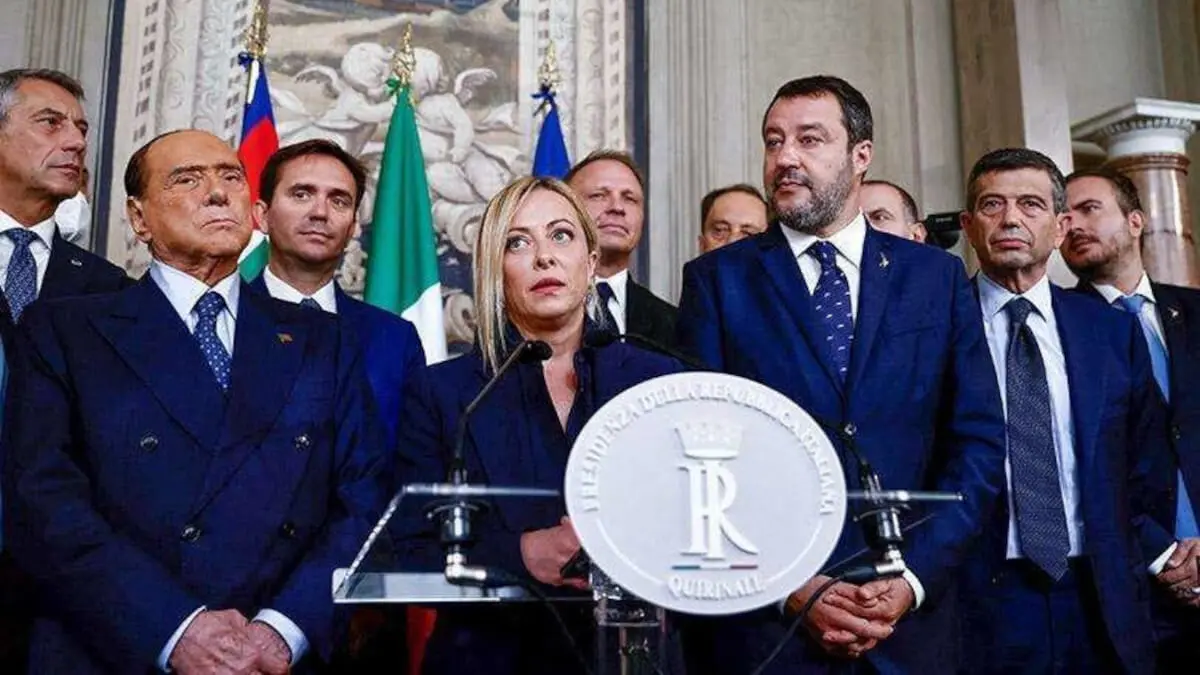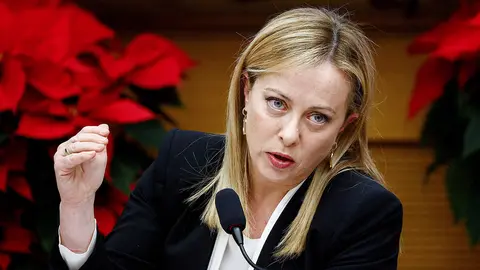The Italian government, facing a possible new sovereign debt crisis

Since between June 2018 and August 2019, the Italian government (headed, in practice, by its two deputy prime ministers Luigi di Maio and Matteo Salvini) has been in constant "litigation" with the EU authorities over the State Budget for 2019 (remember that the third largest economy in the Eurozone was twice on the verge of being taken to court for excessive debt, although in the end it was merely a warning), the various Italian governments had avoided any kind of conflict with the European Union and, in particular, with the Commission.
All of them benefited from not applying the Stability and Growth Pact for the budgets of 2021, 2022 and 2023, but now, with it active again, although not under the "dracronian" conditions of 2010-2016, Prime Minister Meloni, who on October will complete her term in office, will have to wait until the end of her term in office, who on 22 October will complete her first year as president of the Council of Ministers, finds herself increasingly close to a new "sovereign debt crisis" that could push the risk premium up to 350 basis points (right now, this premium is hovering between 190 and 200).
Let us begin by pointing out that the Meloni government, despite its landslide victory in the September 2022 elections, and the very large "maggioranza" that this gave the centre-right (almost 120 senators out of a total of 200), never generated confidence in the markets, even though Meloni made it clear from the outset that he intended to follow the "road map" set by the previous "premier" (Mario Draghi) and which took the form of the so-called PNRR, which was based on the assumption that the country had been granted 209 billion euros for the 2020-27 European budget in order to promote digital economies that are fully compatible with environmental protection.
The first obstacle the new prime minister encountered was that no "big name" economist wanted to take over the economy and finance portfolio. She had said during the election campaign that, should she win the elections, her choice would be the prestigious economist Fabio Panetta, at that time a member of the board of the European Central Bank (ECB). But when the time came to form a government, the figure of Panetta was nowhere to be seen. In fact, he only agreed to return to his country if it was to become the new governor of the Bank of Italy, knowing that Ignazio Visco's replacement was very close.
And so it was: Panetta was appointed before this summer as the new governor of "Bankitalia", thus fulfilling what many had expected. At the same time, it weakened the transalpine position at the ECB, which not only lost Panetta but also Andrea Enria, who, with Mario Draghi presiding over the bank based in Frankfurt am Main (Germany), had taken over the supervision of the Single Market, but has now been replaced by a German.
Although Mario Draghi took charge of the government in the midst of the "coronavirus" crisis (13 February 2021), it did not take long to see the enormous confidence that his person generated in the markets: it was only after learning that he had received from President Mattarella the "incarico" to form a government that the stock market immediately rose and the risk premium fell, despite the very high public debt that the country had at that time. The reality is that, while the Draghi government was received by the markets with a risk premium of only 91 basis points (15 February 2021), the Meloni government, on the other hand, found itself (22 October 2022) with no more and no less than 235 basis points.
Paradoxical as it may seem, the markets distrust the centre-right more than the centre-left. Because it was a centre-right government (the fourth Berlusconi government) that was finally intervened by the European Union (being replaced by Mario Monti, prime minister on 16 November 2011), and now, once again with the centre-right holding the "maggioranza", Meloni ended up finding that it was not exactly well received by the holders of public debt issued by the Italian state.
Between February 2021 and May 2022 (that is, until almost the end of the Draghi government, which fell on 20 July 2022), the risk premium remained not only below 200 points, but on many occasions below 100 points (for example, the entire month of September 2021 was between 94 and 99 points), but when Meloni arrived, the norm was almost always above 150 basis points. It surely did not help that in the election campaign he had made spending promises that his rival Matteo Renzi, now in opposition with the "Terzo Polo", had described as a "programme full of unrealistic promises".
The truth is that Meloni put together a government with valuable people, such as Nordio in Justice, Tajani in Foreign Affairs and Piantedosi in Interior, but it was clear that the economic area was by far the weakest. There were only two economists of worth in parliament at the time: Tremonti, elected MP with the party for Meloni, but vetoed for being the head of economy and finance at the time of the famous intervention in November 2011; and Cottarelli, former chief economist of the International Monetary Fund and senator for the Democratic Party (PD).
Cottarelli, being in the opposition, could not take over this portfolio, and furthermore decided to leave politics when the radical left-wing Ely Schlein took over the PD's General Secretariat in February this year. So Meloni had no choice but to appoint Giancarlo Giorgetti, "number two" in Salvini's League, as Minister of Economy and Finance, because at least he had been Minister of Economic Development under Draghi and had studied at the prestigious Bocconi University, where the country's economic elites are trained. But it was only a solution of circumstances in the absence of candidates, because Giorgetti was and is a born politician who has a very good grasp of economics.
The best proof of how little confidence the markets have in the eurozone's third largest economy being able to refinance itself is to be found in the risk premiums of the most indebted countries. Greece itself, with the highest public debt to GDP ratio in the entire European Union, currently has a risk premium of around 150 points. And other countries whose debt, such as Italy and Greece, also exceeds 100% of GDP, are even better off: Spain, at 100-105 at most; Portugal, at 74-77; Belgium, at 64-67; and, finally, France, at 54-57.
To locate the starting point of this more than likely new sovereign debt crisis, we must go back to last July, when it became known that the transalpine economy had shrunk by -0.3%, in a quarter (April-June) of normal growth.
But the return from the summer has been even worse: the government has had to admit that the initial growth forecast of 1% for 2024 has become 0.8%; and that for the following year, instead of 1.7%, it will be 1.5%. From there, the Ministry led by the "legista" Giorgetti must first present the DEF document (where the deficit and debt targets are set), and then submit to the European Commission the draft or preliminary draft of the General State Budget for 2024, which will be examined "with a magnifying glass" during the month of November to return to the national Parliament in December for its final approval.
The role played by the dreaded rating agencies, such as Fitch, Moody's and Standard & Poor's, which refuse to give the 'A' rating that they do give to German, French and Spanish debt, respectively, will play a key role. They will be the ones to pass judgement on the country's ability to refinance its debt, which in no case is expected to fall below 139-140% in the coming years, that is, eighty points above the Maastricht Treaty (which required a maximum of 60% of debt as a percentage of national GDP).
The Meloni government has been hit hard by rising commodity prices: not only Italy, but also Germany and France, have very low growth forecasts for 2024 because industry is seeing its production costs soar, and it is becoming increasingly difficult to sell both domestically and internationally.
But, of course, of the three, the one with the biggest problems is precisely the eurozone's third largest economy, because the debt to GDP ratio, plus chronically low growth (if not recession) is an increasingly heavy burden. And it was all very easy for the young Roman politician during her first year in government (with the exception of the migration issue, on which the European Union has just reached a very important pact), but now she is going to have to face the same fate as others who also presided over the Council of Ministers. The only solution, faced with the rising deficit, is to cut spending, but it is well known that this generates a lot of unpopularity.
Will Meloni do it, or will he prefer to go down the path of demagogy and populism that his government colleague Matteo Salvini is so fond of? We shall see in a short time.
Pablo Martín de Santa Olalla Saludes is a lecturer at Camilo José Cela University and author of the book "Historia de la Italia republicana, 1946-2021" (Sílex Ediciones, 2021).



